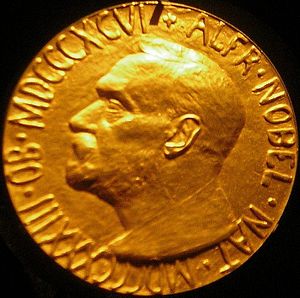This year’s Nobel Peace Prize was shared between an Indian and Pakistani, at a time when military tensions on the Indo-Pakistani border in Kashmir have reached their deadliest point in over a decade. This, of course calls into question whether the Nobel Peace Prize has again been awarded to make a political statement, especially since it was given to two individuals who, while working for noble causes, did not work together and whose work was only marginally related to the cause of world peace.
The two winners of this year’s Nobel Peace Prize were Pakistan’s Malala Yousafzai and India’s Kailash Satyarthi. Malala, as she is popularly known, needs no introduction. At 17, she is the youngest recipient of the prize. She is the well-known promoter and symbol of female education in Pakistan who was shot by the Taliban in 2012 for campaigning for the right of girls to attend school. Satyarthi, who is 60, has been a longtime crusader against child slavery. His organization, the Bachpan Bachao Andolan (Save the Child Movement) has been credited with saving thousands of children from forced labor and abuses.
Unfortunately, the Nobel Peace Prize, unlike some of the science-oriented Nobel Prizes, has totally lost sight of its original purpose and has instead become a vehicle for the Nobel committee to make political statements or promote social causes. Nobody can deny that the causes that Satyarthi and Malala stand for are good, important and mostly uncontroversial. Yet, the selection of these individuals, and of many individuals in the recent past, seems to deviate from Alfred Nobel’s wish that the Peace Prize be given to someone who pursued the promotion of peace, which is the lack of war. According to Alfred Nobel, the prize ought to be given “to the person who shall have done the most or the best work for fraternity between nations, the abolition or reduction of standing armies and for the holding and promotion of peace congresses.”
And yet, according to the Nobel committee, this year’s prize was awarded jointly to Kailash Satyarthi and Malala Yousafzai “for their struggle against the suppression of children and young people and for the right of all children to education.” This was not a joint struggle between the two individuals and was not coordinated, as they worked on different aspect of children’s rights. These two individuals did not work with each other and did not necessarily work towards a common cause. They did nothing in particular to promote peace and “fraternity between nations.”
Leaving that aside, it hardly seems fair to compare their work. Malala, while being an important symbol, has hardly done anything noteworthy in the past few years other than making speeches. It is hard to say she has actually done anything that merits such an award. Unfortunately she seems to be rapidly on her way to becoming another commercialized symbol who makes a lot of speeches from exile and is disassociated with the situation on the ground in her home country. On the other hand, while Satyarthi has been campaigning to end child labor in India for decades, the problem is often exaggerated in order to gain funds from NGOs. Moreover, it is a problem that is extremely complicated, as children must often work to make ends meet for their families and are not always exploited. It is also a problem that is going away on its own gradually through social change and increased schooling and wealth. No matter how one looks at the problem of child labor though, it is obviously not one that fits the requirements of the Nobel Peace Prize. Surely there are many more noteworthy individuals or statesmen in South Asia or the rest of the world that are more deserving of the prize.
On the whole, neither Malala nor Satyarthi have done anything worthy of the prize. On the other hand, neither of them deserve to be condemned and we wish them the best of luck in furthering their causes. However, the rationale for both of these individuals jointly receiving the prize smacks of the committee’s attempt to make a political statement. While Malala was a frontrunner for several years, the committee openly admitted that it chose Satyarthi to try to make a point. The chairman of the committee said: “What we are saying is that we have awarded two people with the same cause, coming from India and Pakistan, a Muslim and a Hindu. It is in itself a strong signal.”
Although Satyarthi and Malala have spoken by phone and agreed to invite the Prime Ministers of India and Pakistan to their award ceremony, it is unclear if this possible meeting will do much to further peace between India and Pakistan. Malala will not be able to stop the Taliban or other groups, such as Boko Haram, that suppress the rights of women. And Satyarthi and Malala jointly receiving the Nobel Peace Prize won’t have any impact on the conflict between India and Pakistan because it is driven by underlying strategic, political, and military factors that cannot be solved by a prize.
However, these strategic problems can eventually be solved by statesmen. This fact itself shows why awarding the prize to symbolic individuals is pointless and counter to the Nobel Peace Prize’s purpose. Ultimately the individuals who actually receive the prize should be those who truly take steps to end conflict.

































